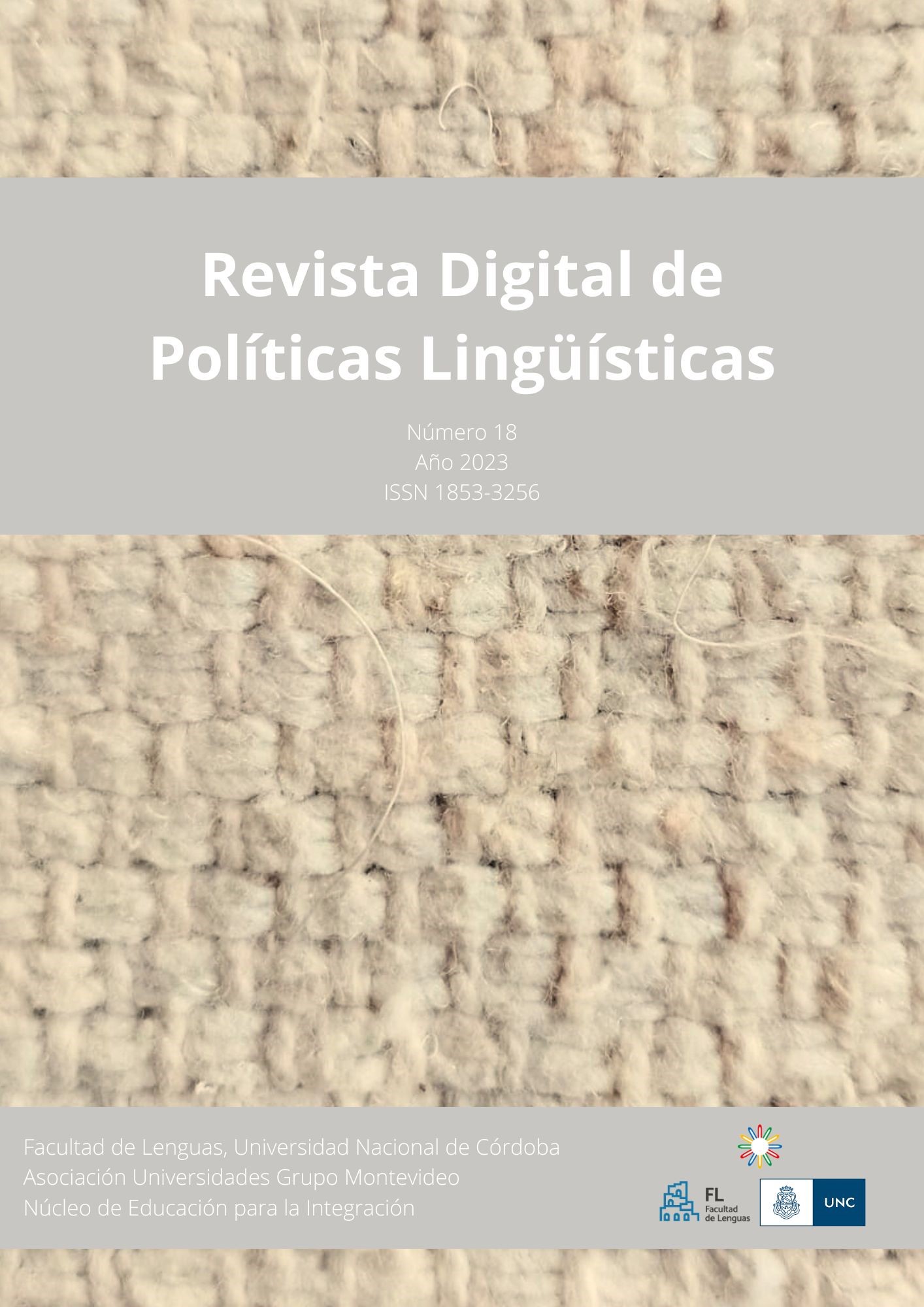LANGUAGES EDUCATION AND GENDER LINGUISTIC POLICIES IN ROSARIO (1984-2014)
Keywords:
gender based linguistic policies, languages, regulatory regims, languages, regulatory regims, sociolinguistic representationsAbstract
This paper focuses on the analysis of the successive versions of the study plans of the Rosario National University’s undergraduate courses in Letras and Portuguese, as well as educational legislation and state curricular designs belonging to the period 1984-2014. The objective has been to relieve the possible impact that the development of the field of studies on language policies could have on the changes of focus on languages as linguistic objects. Likewise, we have tried to trace gender based linguistic policies, that is, the implicit or explicit inclusion of considerations about the role that gender relations and discourses have in the articulation between linguistic forms and their social value.
Downloads
References
Arnoux, E. (2010). Representaciones sociolingüísticas y construcción de identidades colectivas en el Mercosur. In M.T. Celada, A. Fanjul & S. Nothstein (Coords.), Lenguas en un espacio de integración: acontecimientos, acciones, representaciones (pp. 17-38). Biblos.
Arnoux, E. y del Valle, J. (2010). Las representaciones ideológicas del lenguaje. Discurso glotopolitico y panhispanismo. Spanish in Context, 7(1), 1-24.
Barrios, G. (2003). Minorías lingüísticas y globalización: el caso de la Unión Europea y el Mercosur. Letras, 27, 11-25.
Bein, R. (2005). Políticas lingüísticas en la Argentina. Legislación y promoción de lenguas. Conferencia presentada en el I Congreso del Mercosur: Intercuturalidad y Bilingüismo en Educación. Ministerio de Educación de la Provincia de Misiones, Posadas.
Butler, J. (1990) Actos performativos y constitución de género: un ensayo sobre fenomenología y teoría feminista. In S.E. Case (Ed.), Performing Feminisms: Feminist Critical Theory and Theatre (pp. 270 -282). John Hopkins University Press.
Butler, J. (2007). El género en disputa. Paidós (Trabajo original publicado en 1990).
Butler, J. (2008). Cuerpos que importan. Paidós (Trabajo original publicado en 1993).
Cameron, D. y Kulick, D. (2003). Language and Sexuality. Cambridge University Press.
De Lauretis, Teresa (2000). La tecnología del género. In Diferencias. Etapas de un camino a través del feminismo. Horas y Horas.
Hall, K., & Bucholtz, M. (Eds.). (1995). Gender articulated. Language and the socially constructed self. Routledge.
Hamel, R. E. (2003). Regional blocs as a barrier against English hegemony? The language policy of Mercosur in South America. In J. Maurais & M. Morris (Eds.), Languages in a Globalising World (pp. 111-142). Cambridge University Press,
Pérez, L., & Rogieri, P. (2011). La metáfora de la internacionalización del español. Revista Digital de Políticas Lingüísticas, 3, 27-48.
Pérez, L., & Rogieri, P. (2015). Políticas del lenguaje y escritura académica. Revista Digital de Políticas Lingüísticas, 7, 168-177.
Feldfeber, M. y Gluz, N. (2012). Introducción. In M. Feldfeber & N. Gluz (Coords.), Las políticas educativas después de los ’90. Regulaciones, actores y procesos (pp. 9-16). CLACSO.
Saforcada, F. (2012). Las leyes de educación después de los años 90: de la hegemonía neoliberal al postconsenso de Washington. Persistencias, sincretismos y transformaciones. In M. Feldfeber & N. Gluz (Coords.), Las políticas educativas después de los ’90. Regulaciones, actores y procesos (pp. 17-42). CLACSO.
Uchida, A. (1998). When ‘Difference’ is ‘Dominance”. A critique of the ‘anti-power-based’ cultural approach to sex differences. In D. Cameron (Ed.), The Feminist Critique of Language: A Reader (pp. 280-292). Routledge.
Wodak, R., y Benke, G. (1998). Gender as a Sociolinguistic Variable: New Perspectives on Variation Studies. In F. Coulmas (Ed.), The Handbook of Sociolinguistics (pp. 188-104). Blackwell.
Downloads
Published
Issue
Section
License

This work is licensed under a Creative Commons Attribution-NonCommercial-NoDerivatives 4.0 International License.
Aquellos/as autores/as que tengan publicaciones con esta revista, aceptan los términos siguientes:
- Los/as autores/as conservarán sus derechos de autor y garantizarán a la revista el derecho de primera publicación de su obra, el cual estará simultáneamente sujeto a la Licencia de reconocimiento de Creative Commons que permite a terceros compartir la obra siempre que se indique su autor y su primera publicación esta revista.
- La cesión de derechos no exclusivos implica que la publicación de los artículos en la presente revista no quita la posibilidad o el derecho al autor de publicar de manera posterior a otras revistas u órganos editoriales y la autorización por parte de los autores para que el trabajo sea depositado en los repositorio institucionales: Portal de Revistas de la Universidad Nacional de Córdoba.



